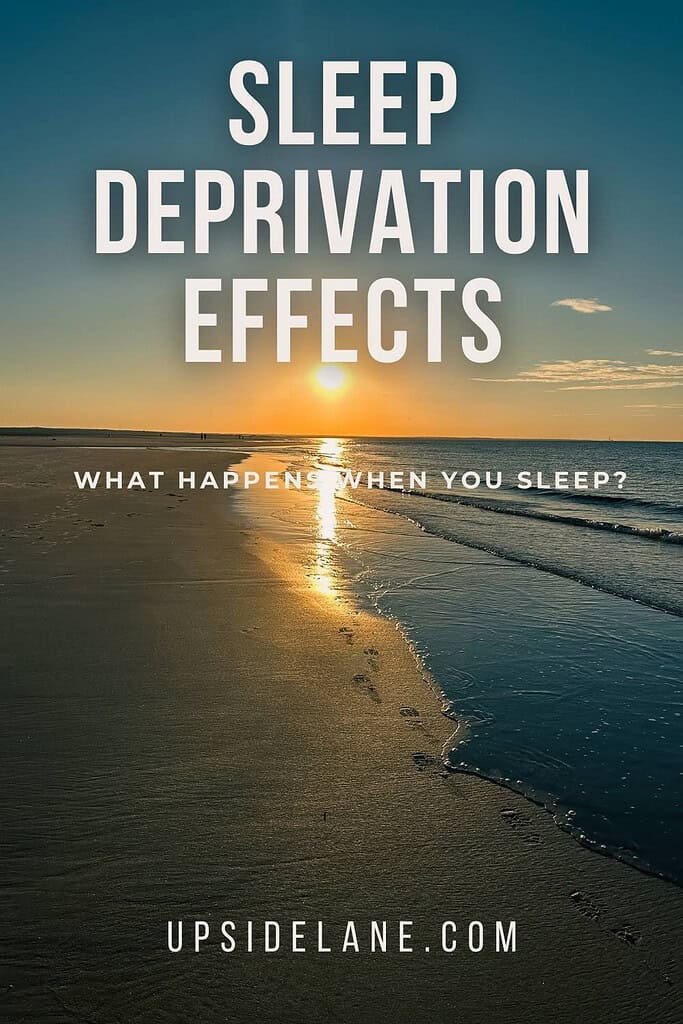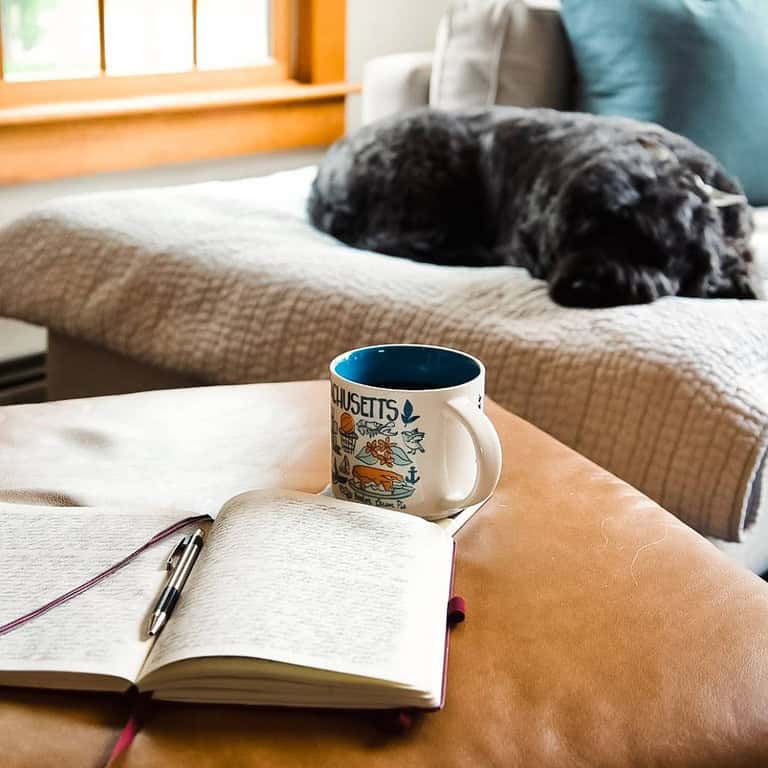Sleep Deprivation Symptoms and Health Effects
Discover the hidden toll of sleep deprivation symptoms and their effects on health. Learn strategies to improve the quality of your sleep and protect your health.

NOTE: This post has been updated since it was originally published on March 11, 2022.
Are you feeling exhausted? At some point, all of us will go through a night or two where we find it difficult to sleep. However, if prolonged, sleep deprivation symptoms can arise and begin to take their toll in every area of our lives.
Our world is fast-paced and sleep problems are common. Yet sleep is a basic human need and a large part of human health but for many, getting enough quality sleep can be challenging.
Some individuals wear lack of sleep as a badge of honor, boasting about late nights and long work hours, seemingly oblivious to the body’s vital need for rest.
In this article, we will look at the effects of sleep deprivation, symptoms, and the impact they can have on our health.
By understanding the far-reaching effects of insufficient sleep, and identifying strategies for improvement, we can work toward better sleep hygiene to enhance our quality of life and overall well-being.
The Importance of Sleep for Overall Health
Sleep quality extends far beyond simply feeling refreshed. It plays an important role in maintaining our health overall – our physical health, cognitive function, and emotional well-being.
When we sleep, the body participates in the vital work of repair and regeneration. Our brain clears out potential toxins and works on consolidating memories.
We spend one-third of our lives sleeping, yet roughly 35% of US adults characterize their sleep as either “fair” or “poor.”
When we consistently fail to get enough sleep, the consequences are profound and can affect nearly every aspect of our lives.
Caregiver’s and Sleep Deficiency
Few groups feel the impact of insufficient sleep more acutely than caregivers – those who devote their time and energy to caring for loved ones with minimal support.
For caregivers, the challenge of regular quality sleep is difficult. They often find themselves caught in a relentless cycle of round-the-clock care, navigating complex medical needs, and managing the emotional toll of watching a loved one struggle with illness or disability.
The demands of being a caregiver often lead to irregular sleep patterns, interrupted nights, and chronic sleep deprivation symptoms.

What Happens When You Sleep?
When we sleep, numerous processes occur that repair and restore our bodies. Here are some of the key functions taking place while we rest.
Human Growth Hormone (HCG). Human growth hormone (HCG) is a substance that is produced in the pituitary gland at the base of our brain. It gets released during the deep stages of sleep and stimulates cells to repair the body.
Lipid Metabolism. During sleep, fat gets broken down for tissue repair.
Protein Synthesis. Protein synthesis, the process of creating proteins, is crucial for maintaining cellular structure, facilitating transport and communication between cells, chemical reactions, and protecting against harmful viruses and bacteria.
This essential function occurs in every cell of our body while we sleep, highlighting the importance of adequate rest for overall health.
Immune System. During sleep, our immune system can rest, recover, and rebalance. When we do not get enough sleep, our body is at risk for systemic inflammation, which makes us more vulnerable to infection and disease.
Antioxidant. Scientists believe one function of sleep is that it acts as an antioxidant for our body and brain, clearing potential free radicals that can damage cells and cause aging and disease.
Sleep is so important that some scientists are now calling sleep disruption and continuous lack of sleep a “probable” carcinogen. So, lack of sleep really could be the new smoking!
Sleep is so important that scientists are now calling continuous lack of sleep as a probable carcinogen. Lack of sleep is the new smoking.
Common Symptoms Of Sleep Deprivation
Sleep deprivation can lead to a variety of common symptoms affecting both our physical and mental well-being.
Here are a few of the most frequently experienced signs of insufficient sleep due to poor sleep habits.
Cognitive symptoms. Decreased attention span, impaired decision-making, and memory issues.
Emotional symptoms. Irritability, mood swings, increased risk of depression and anxiety.
Physical symptoms. Fatigue, daytime sleepiness, weakened immune system, changes in appetite.

Health Effects Of Long-Term Sleep Deprivation
Feeling exhausted during the day, lacking quality sleep at night, and experiencing sleep deprivation symptoms is no joking matter. The health risks are real. Here is a list of risk factors you may face if you do not get enough sleep.
- Cancer – there is an increased cancer risk and increased mortality for adults sleeping an average of less than 6.5 hours per night.
- Obesity and diabetes – lack of sleep contributes to obesity and type 2 diabetes, as it changes the way the body regulates insulin causing potential insulin resistance.
- Heart disease. not getting enough sleep increases our risk of high blood pressure and cardiovascular disease,
- Increased appetite – sleep regulates appetite so if you are sleep-deprived, you may experience an increase in hunger, cravings, and potential weight gain.
- Depression – sleep is a mood regulator. Lack of sleep can enhance moodiness and make you more vulnerable to depression.
- Dementia and Alzheimer’s – lack of sleep increases your risk of dementia and Alzheimer’s disease.
Sleep Guidelines From The National Sleep Foundation
So how much sleep should you be getting regularly? According to the National Sleep Foundation, the amount of sleep you should get each day varies according to age. Here are the guidelines.
- Newborn (0-3 months): 14-17 hrs p/day
- Infants (4-11 months): 12-15 hrs p/day
- Toddlers (1-2 years): 11-14 hrs p/day
- Preschoolers (3-5 years): 10-13 hrs p/day
- School-age Children (6-13 years): 9-11 hrs p/day
- Teenagers (14-17 years): 8-10 hrs p/day
- Younger Adults (18-25): 7-9 hrs p/day
- Adults (26-64): 7-9 hrs p/day
- Older Adults (65+): 7-8 hrs p/day
Given the critical role of sleep in maintaining health and avoiding sleep deprivation symptoms, it is essential to prioritize rest and get the appropriate hours of sleep necessary.

Strategies To Improve Sleep Hygiene
Here are suggestions to improve your sleep routine and help you achieve a restful night’s sleep. Implementing these tips can help improve your overall sleep quality.
Consistency
Work on developing a consistent schedule. Aim to go to bed and get up at the same time each day, this includes weekends. Playing catch-up on the weekends does not work, as you do not reap the same health benefits.
Regular Physical Activity
Regular exercise will help you fall asleep faster and improve the quality of your sleep. However, the timing of exercise could matter. For some, exercising in the evening may disrupt their quality of sleep.
When exercising, endorphins get released and your core body temperature rises. For some, this could keep them up at night. So pay attention and determine what works best for your body.
Relaxation Methods
Consider taking up yoga, meditation, or other relaxation methods for improved sleep quality.
Free educational videos are available online to teach and guide you in these areas, and It does not have to be a formal class or expensive.
Bedtime Routine
Work on developing a relaxing bedtime routine, at least one hour before bed. This could include lighting a candle and reading a book, taking a warm bath or shower, perhaps doing some light stretches, or sipping a warm cup of herbal tea, anything that will help you feel calm and relaxed.
No Electronic Devices
To ensure quality sleep and avoid sleep deprivation symptoms, it is important to turn off electronic devices at least one hour before going to bed. Ideally, you should aim to do this two to three hours beforehand.
No devices means no television, mobile phones, computers, iPads, etc. The light from these gadgets prevents your body from producing the melatonin needed to ensure quality sleep. This should be a very hard rule.
No Caffeine or Alcohol
Caffeine and alcohol are stimulants that can disrupt sleep. Many people believe alcohol is a suppressant but in fact, it does just the opposite.

Limit Naps
Napping will throw off your circadian rhythm and sleep/wake cycle. Keep napping to a minimum as best you can.
No Late-Night Snacking
Eating within an hour or so before going to sleep can disrupt your sleep cycle. Your body will work on digesting the food you just ate versus resting and recovering.
NOTE: Some people find they sleep better if they have a small snack shortly before bed. People with blood sugar issues may fall into this category. Listen to your body and pay attention to its needs.
Dark Environment
Our circadian rhythm, which regulates the sleep/wake cycle, is very sensitive to light, so it is important to be in a dark environment when we sleep. Even small amounts of light can be disruptive.
Pay attention to light from a clock or cable box, and cover them if possible. Sleep with the shades or curtains down. Better yet, get yourself some blackout curtains if you can!
Cool Temperature
Keeping the bedroom cool will help your quality of sleep. We get the most restorative sleep when we are in rapid eye movement (REM) sleep, and heat is known to be a big disrupter of REM sleep. So aim to cool down your room as much as possible. Sleep specialists say 60-67 degrees Fahrenheit works best.
No Sleeping Pills
Sleeping pills are not the answer because they do not get to the root of the problem. Sleeping pills prevent you from moving through all of the stages of sleep, and they will not give you restorative sleep.
Learning, conditioning, and training your body to maintain an excellent sleep hygiene program is important, especially as a caregiver.
Developing quality sleep habits takes time and discipline, but as a caregiver, you cannot take good care of others unless you take good care of yourself.
Medical Conditions That Contribute To Severe Sleep Deprivation
Several medical conditions can exacerbate sleep deprivation. In this case, talking to your healthcare provider or even a sleep specialist for support is important.
Obstructive sleep apnea. This sleep disorder can significantly interrupt breathing while sleeping, which leads to fragmented rest. Using a continuous positive airway pressure (CPAP) machine can help tremendously while sleeping.
Bipolar disorder. Having bipolar disorder can greatly disrupt sleep patterns due to mood fluctuations. Again, it is important to work with a healthcare professional who is an expert in this field for guidance.
Respiratory disease. Respiratory diseases can complicate nighttime breathing but there are effective tips and techniques to improve sleep quality. It is important to seek professional help to address these issues.
Menopause. Hormonal changes that occur during peri-menopause and menopause commonly cause sleep disturbances. That said, you can talk to your doctor about pharmacological as well as non-pharmacological options that are available for support if the sleep disturbances are too severe.
Restless Legs Syndrome. This syndrome creates uncomfortable sensations that can hinder the ability to fall asleep, which further diminishes sleep quality. It is important to talk to your doctor for help and support in this area.
More Articles To Enjoy
- Infrared Sauna Benefits: Using My Sauna At Home
- 5 Simple Dumbbell Exercises: Full Body Beginner Workout
- Grief Is The Price Of Love: The Loss Of My Mother
- Perfectionism: Striving For Perfection And Losing
- Journaling Ideas For Beginners: Daily Writing Habits
Additional Support For Caregivers
Let’s Connect
I hope you found this article on sleep deprivation, symptoms, and strategies helpful.
Sleep is an important part of our well-being, and while it can be challenging to achieve regularly, you are not alone.
QUESTION: What are some effective strategies you have used to help you get a good night’s sleep?
Let me know in the comment section below, I’d love to hear from you.
Here’s to discovering what works best for you and enjoying more restful nights ahead.







LOVE this! Sleep deprivation is no joke!
No it certainly is not. Thank you Penny!